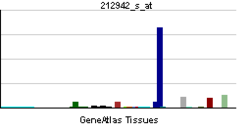KIAA1199
Protein KIAA1199 is a protein that in humans is encoded by the KIAA1199 gene.[1][2][3] The KIAA1199 gene is a recently identified novel gene and one of 1,087 long cDNAs (named KIAA) that encode large proteins (average length of KIAA family member is 872 amino acids).
References
Further reading
- Nagase T, Ishikawa K, Kikuno R et al. (2000). "Prediction of the coding sequences of unidentified human genes. XV. The complete sequences of 100 new cDNA clones from brain which code for large proteins in vitro.". DNA Res. 6 (5): 337–45. doi:10.1093/dnares/6.5.337. PMID 10574462.
- Wines ME, Lee L, Katari MS et al. (2001). "Identification of mesoderm development (mesd) candidate genes by comparative mapping and genome sequence analysis.". Genomics 72 (1): 88–98. doi:10.1006/geno.2000.6466. PMID 11247670.
- Nakayama M, Kikuno R, Ohara O (2003). "Protein–Protein Interactions Between Large Proteins: Two-Hybrid Screening Using a Functionally Classified Library Composed of Long cDNAs". Genome Res. 12 (11): 1773–84. doi:10.1101/gr.406902. PMC 187542. PMID 12421765.
- Abe S, Katagiri T, Saito-Hisaminato A et al. (2003). "Identification of CRYM as a Candidate Responsible for Nonsyndromic Deafness, through cDNA Microarray Analysis of Human Cochlear and Vestibular Tissues". Am. J. Hum. Genet. 72 (1): 73–82. doi:10.1086/345398. PMC 420014. PMID 12471561.
- Strausberg RL, Feingold EA, Grouse LH et al. (2003). "Generation and initial analysis of more than 15,000 full-length human and mouse cDNA sequences". Proc. Natl. Acad. Sci. U.S.A. 99 (26): 16899–903. doi:10.1073/pnas.242603899. PMC 139241. PMID 12477932.
- Gerhard DS, Wagner L, Feingold EA et al. (2004). "The Status, Quality, and Expansion of the NIH Full-Length cDNA Project: The Mammalian Gene Collection (MGC)". Genome Res. 14 (10B): 2121–7. doi:10.1101/gr.2596504. PMC 528928. PMID 15489334.
- Guo J, Cheng H, Zhao S, Yu L (2006). "GG: a domain involved in phage LTF apparatus and implicated in human MEB and non-syndromic hearing loss diseases". FEBS Lett. 580 (2): 581–4. doi:10.1016/j.febslet.2005.12.076. PMID 16406369.
